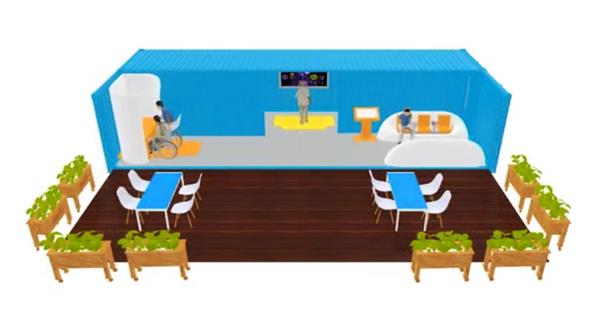Marcus Butler
3 July 2015: University of Canberra academics have taken home three prizes at the InnovAGE Aged Care Hackathon, for their use of new technology to improve the lives of older Australians.
Assistant professor of design Fanke Peng placed second overall and was runner-up in the iBeacon category for her project Wearable Memory.
Wearable Memory is functional jewellery designed to help the elderly feel more connected while also acting as a safety device. Photos which have been uploaded to the cloud, can be accessed by the wearer when they are out and about.
“When a person with a Wearable Memory device approaches a receiver device at a determined location the digital display responds by showing their personalised photo album, bringing those memories to life,” Dr Peng said.
“These devices could be used at aged care facilities or retirement villages, museums, galleries, and shopping centres and aims to help the elderly interact and re-engage with their community.”
The beacon can also act as a safety device at aged care facilities, sending an alarm to staff if the resident leaves the facility.
Learn more about Wearable Memory, including a video collaboration with assistant professor in media arts and graphic design Ana Sanchez Laws.
Meanwhile, a second University of Canberra entry was named runner-up in the Kinect/VR project category.
The StoryTelling TimeMachine was created by assistant professors of design Lisa Scharoun, Raghavendra Gudur, Dr Peng, associate professor of industrial design Carlos Montana Hoyos, and Simon Cunich and Sam Tomkins.
Dr Scharoun describes the project as a ‘third space’ for older people to connect with each other and the broader community, which exists outside the home or care facility and beyond commercial venues.
“This movable playspace is a comfortable venue where the elderly can engage or simply enjoy sitting back and listening without the pressure to purchase anything,” she said.
Dr Scharoun said the space balances technology, such as computers and motion-controlled video games, alongside areas to interact and share their stories with others.
“It is a place to share their vast wealth of experiences with the future generation and a place where they can enjoy fun low-impact activities to get them up and moving giving them a feeling of connection and self-worth,” Dr Scharoun said.
The InnovAGE Hackathon was held at the University’s Inspire Centre.



